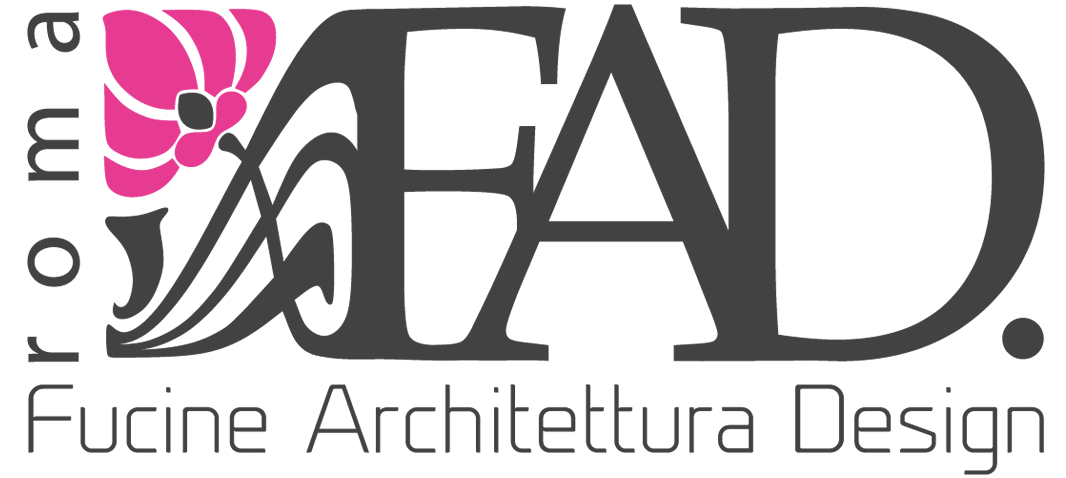The architect at the time of the Coronavirus
Reflections by the Architect Fabrizio Forniti and the resilience of the FAD Architecture Studio
The impact of Coronavirus on the architectural world.
In my opinion, two aspects must be assessed to consider the impact that the Covid-19 virus had on the world of architecture:
- The first concerns the impact that this sudden event had on the working methods of all architecture and engineering firms on a global scale: the smart-working. Many large and medium-sized companies had already started to use it for various reasons, primarily of an economic nature. In recent times, this working method had a great acceleration and extended to professional and design studios, which had used it in minimum part, until now. I am sure that, once the emergency is over, we will resume to physically work in a team, because human being in general, and the architect in particular, needs to "physically" deal with his / her interlocutors, to fully sense their tastes, ideas, and moods. We need to see and perceive first hand with all our senses the places, the spaces, the materials, etc. It is not possible to do that in "remote" or online... The architect must fully experience the world and nature in order to be himself / herself.
- The second, which will be assessable only in the medium and long term, is how this infection has impacted our way of living and working on a global level, and how architecture will be able to respond to this change. For example, it will be necessary to understand how the various public and private subjects will change their approach to work, once we return to "usual" conditions. We have to understand if the current smart working methods will be fully or partially maintained, resulting in a reduction in the size of large offices and transformation of the large management assets. We have to understand how our habits towards meeting and sharing places will change, such as coffee bars, restaurants, places of entertainment, fitness facilities, etc. Eventually, we have to understand the consequences that the current experience will have on living places, such as our home or the common condominium areas, that we have been forced to live without continuity for many weeks. Surely, there will be changes in our ways of living and the world of architecture must be ready to manage and rule these changes, to convey them into models that may improve the quality of life and minimise their environmental impacts.
The changes that specifically occurred for the FAD Studio.
Our studio promptly reacted to the events that were happening. Thanks to both the great availability and ability of our working team, and to the constant organisation and computerisation works implemented over the years, we were able to quickly reorganise our work activities in Smart working. All our employees are currently working from home, carrying out a continuous updating and coordination of the various work groups through calls, web-meetings, reports, and shared cloud archives, and whatever else is made available by modern technology..
In my opinion, two aspects must be assessed to consider the impact that the Covid-19 virus had on the world of architecture:
- The first concerns the impact that this sudden event had on the working methods of all architecture and engineering firms on a global scale: the smart-working. Many large and medium-sized companies had already started to use it for various reasons, primarily of an economic nature. In recent times, this working method had a great acceleration and extended to professional and design studios, which had used it in minimum part, until now. I am sure that, once the emergency is over, we will resume to physically work in a team, because human being in general, and the architect in particular, needs to "physically" deal with his / her interlocutors, to fully sense their tastes, ideas, and moods. We need to see and perceive first hand with all our senses the places, the spaces, the materials, etc. It is not possible to do that in "remote" or online... The architect must fully experience the world and nature in order to be himself / herself.
- The second, which will be assessable only in the medium and long term, is how this infection has impacted our way of living and working on a global level, and how architecture will be able to respond to this change. For example, it will be necessary to understand how the various public and private subjects will change their approach to work, once we return to "usual" conditions. We have to understand if the current smart working methods will be fully or partially maintained, resulting in a reduction in the size of large offices and transformation of the large management assets. We have to understand how our habits towards meeting and sharing places will change, such as coffee bars, restaurants, places of entertainment, fitness facilities, etc. Eventually, we have to understand the consequences that the current experience will have on living places, such as our home or the common condominium areas, that we have been forced to live without continuity for many weeks. Surely, there will be changes in our ways of living and the world of architecture must be ready to manage and rule these changes, to convey them into models that may improve the quality of life and minimise their environmental impacts.
The changes that specifically occurred for the FAD Studio.
Our studio promptly reacted to the events that were happening. Thanks to both the great availability and ability of our working team, and to the constant organisation and computerisation works implemented over the years, we were able to quickly reorganise our work activities in Smart working. All our employees are currently working from home, carrying out a continuous updating and coordination of the various work groups through calls, web-meetings, reports, and shared cloud archives, and whatever else is made available by modern technology..
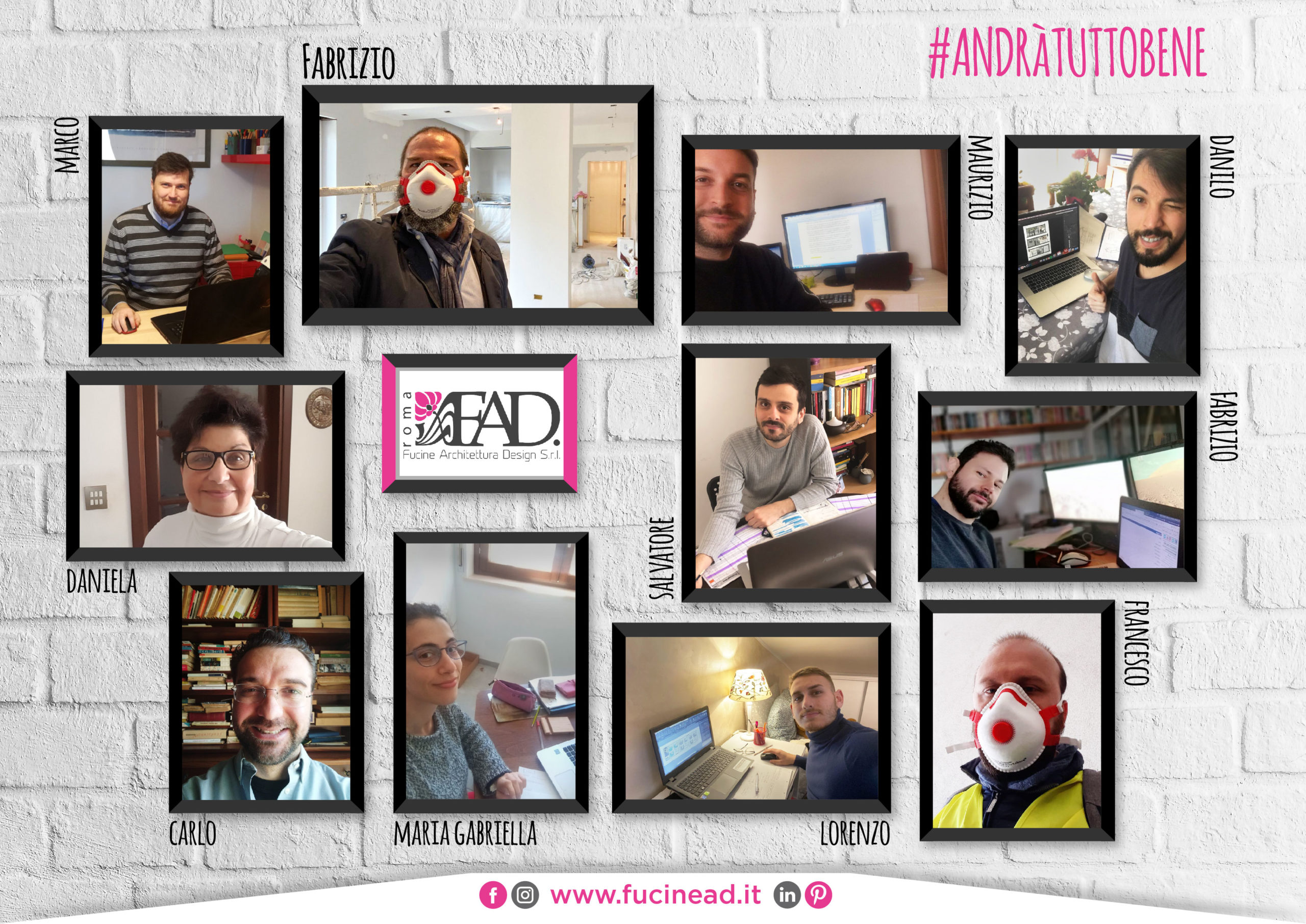
The impact of the lockdown on construction sites. Organisation and solutions.
Fortunately, the engineering and architecture services have been considered essential by the Government; they could have kept in operation, also and above all in this period of crisis, during which almost all the activities had to close, with the exception of the strictly essential ones. In my opinion, this occurred both because architecture and engineering were considered indispensable for the design and preparation of construction sites for all the urgent adaptation works that our country required, and because it was recognised as an intellectual activity, that can be carried out in total safety through the Smart working. thanks to the tools made available by technology.
Fortunately, the engineering and architecture services have been considered essential by the Government; they could have kept in operation, also and above all in this period of crisis, during which almost all the activities had to close, with the exception of the strictly essential ones. In my opinion, this occurred both because architecture and engineering were considered indispensable for the design and preparation of construction sites for all the urgent adaptation works that our country required, and because it was recognised as an intellectual activity, that can be carried out in total safety through the Smart working. thanks to the tools made available by technology.
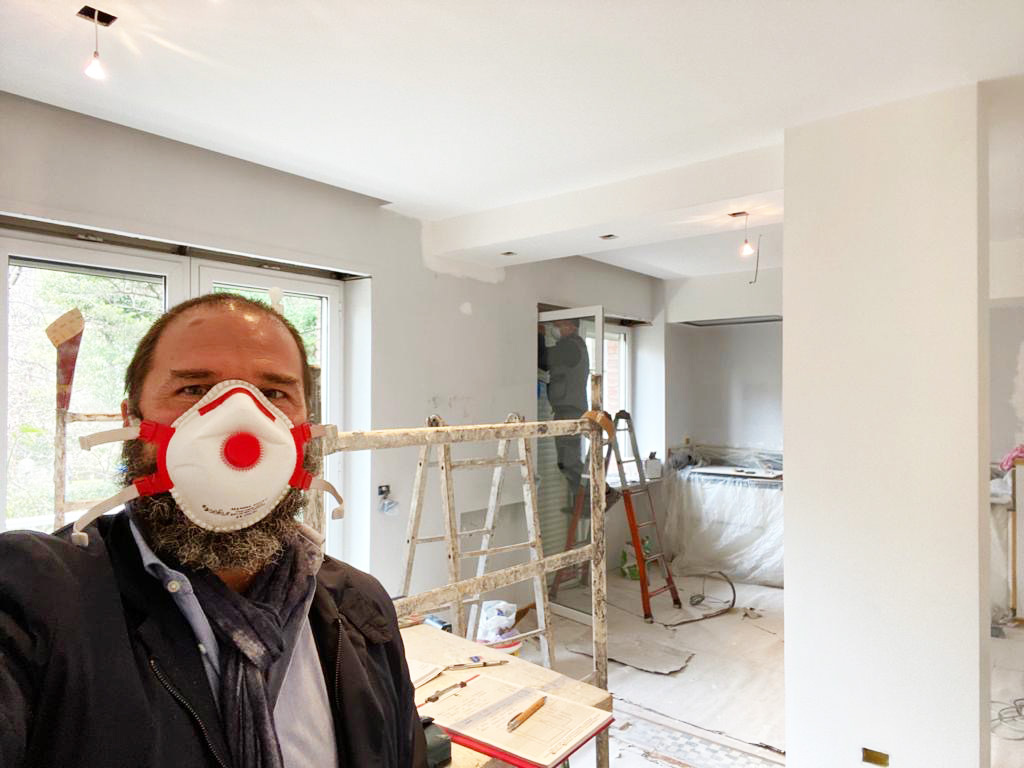
Thanks to the tools made available by technology, this working method has allowed each employee to stay at home and carry out his / her activities, in complete connection and coordination with the members of his / her working team, With regard to the construction sites not concerning strategic works, the decision whether to stop or continue the construction activities by adopting all the necessary safety measures, was initially referred to the employers and to the clients, in some cases supported by their own technical consultants (site managers and safety coordinators). In this first phase, which lasted until the adoption of the Prime Ministerial Decree of 22.03.2020, in agreement with the employers of the companies and clients, we decided to interrupt all those construction sites where the necessary safety measures for workers and for any other persons (for example the tenants or owners of buildings subject to intervention) cannot be ensured. During this period, each member of our staff managed his / her ordinary work activities from home, carrying out the necessary site inspections and checking, among other things, that all the necessary safety measures were adopted by companies and workers. All our staff members were obviously equipped with their own PPEs and all the appropriate procedures were implemented (such as, use of private means of transport, use of PPEs such as masks, glasses and gloves, physical distancing from other people).
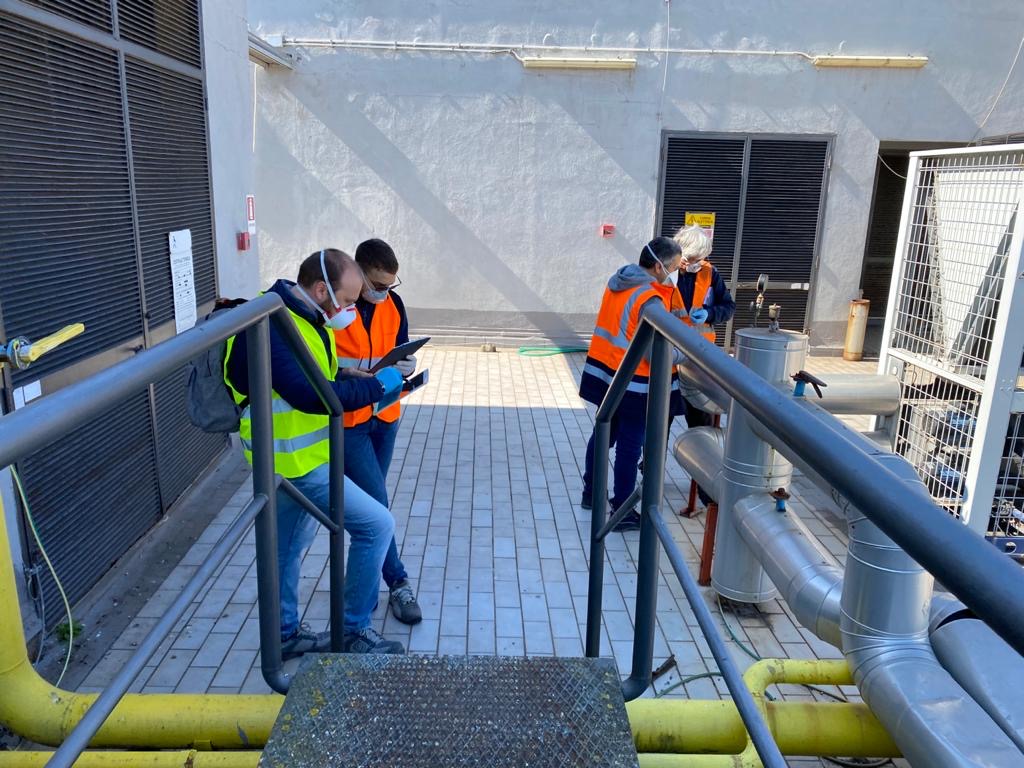
Lockdown and Smart working. The reaction of the FAD Team.
Once the total lockdown entered into force, we suspended all the activities of the various construction sites and continued with our ordinary design and technical consultancy activities in Smart working.
Each collaborator of our studio regularly carries out his / her activity from home, directly accessing the server of the studio and the shared cloud folders, created for the various orders. A number of calls and meetings, appropriately scheduled throughout the day, are regularly carried out; they involve members of our studio, external consultants, suppliers, customers, etc. Practically, it seems that the works is become virtual and avatars have replaced us. Tons of paper are no longer printed, and virtual documents surf the web; they are corrected, modified, and digitally signed, if necessary and finally sent through different methods.
Fortunately, all our collaborators positively reacted to this new working method, and thanks also to the technological and organisational efforts we have made over the time, the activities continued regularly.
Once the total lockdown entered into force, we suspended all the activities of the various construction sites and continued with our ordinary design and technical consultancy activities in Smart working.
Each collaborator of our studio regularly carries out his / her activity from home, directly accessing the server of the studio and the shared cloud folders, created for the various orders. A number of calls and meetings, appropriately scheduled throughout the day, are regularly carried out; they involve members of our studio, external consultants, suppliers, customers, etc. Practically, it seems that the works is become virtual and avatars have replaced us. Tons of paper are no longer printed, and virtual documents surf the web; they are corrected, modified, and digitally signed, if necessary and finally sent through different methods.
Fortunately, all our collaborators positively reacted to this new working method, and thanks also to the technological and organisational efforts we have made over the time, the activities continued regularly.
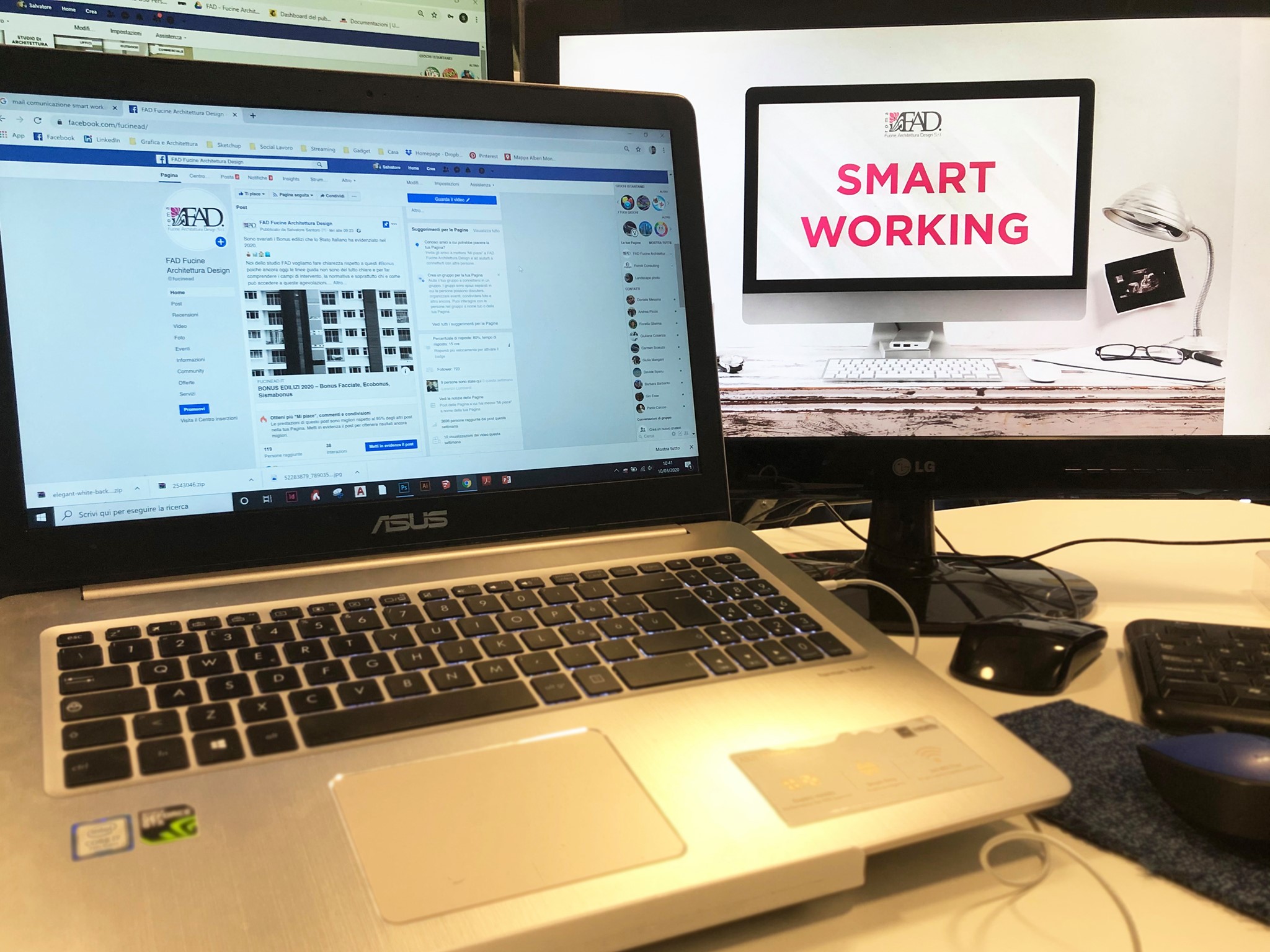
Positive aspects and lessons received.
This new working method has certainly had a huge impact on the organisation of professional and design studios, of the various private companies, but also of the various public bodies and offices, that were often technologically and organizationally backward. They have been therefore obliged to adopt new working and operating models, all of a sudden. The hope is that this forced experience will result in a revision of the organisational and working models adopted so far, especially by the public administration which has always struggled to renew itself in the past, especially in the case of large public and local authorities. During the whole emergency, we have realised we can do things in a different way compared to how we were used to in the past, avoiding unnecessary prints, transfers, or displacements of people, that have huge impacts on nature on a large scale. Nature that is currently breathing a sigh of relief in this moment of stop of many activities.
Another remarkably interesting aspect of this period is the great development of Webinars and virtual meetings, promoted by manufacturing companies and training bodies that have allowed to create moments of encounter, given that fairs, exhibitions, and events cannot be organised, at present. Surely, this is another positive element, which however can never replace the opportunities of real encounters.
Last but not least, another positive aspect is that the work has taken on a more human character, during this phase; it is less "formal" and certainly more relaxed. In many cases, the domestic and human spheres made a "pitch invasion" in the working sphere, without demeaning the latter; other times, we "glanced" into other people's homes through video meetings or video calls, thus sensing their tastes and habits. Sometimes, boisterous “interferences” of children or pets were noticed... this simply made the work warmer and more human.
Many of us have had the opportunity to better reconcile their work with their human and personal needs, and to discover that, in many cases, there is another way of working and doing things.
This new working method has certainly had a huge impact on the organisation of professional and design studios, of the various private companies, but also of the various public bodies and offices, that were often technologically and organizationally backward. They have been therefore obliged to adopt new working and operating models, all of a sudden. The hope is that this forced experience will result in a revision of the organisational and working models adopted so far, especially by the public administration which has always struggled to renew itself in the past, especially in the case of large public and local authorities. During the whole emergency, we have realised we can do things in a different way compared to how we were used to in the past, avoiding unnecessary prints, transfers, or displacements of people, that have huge impacts on nature on a large scale. Nature that is currently breathing a sigh of relief in this moment of stop of many activities.
Another remarkably interesting aspect of this period is the great development of Webinars and virtual meetings, promoted by manufacturing companies and training bodies that have allowed to create moments of encounter, given that fairs, exhibitions, and events cannot be organised, at present. Surely, this is another positive element, which however can never replace the opportunities of real encounters.
Last but not least, another positive aspect is that the work has taken on a more human character, during this phase; it is less "formal" and certainly more relaxed. In many cases, the domestic and human spheres made a "pitch invasion" in the working sphere, without demeaning the latter; other times, we "glanced" into other people's homes through video meetings or video calls, thus sensing their tastes and habits. Sometimes, boisterous “interferences” of children or pets were noticed... this simply made the work warmer and more human.
Many of us have had the opportunity to better reconcile their work with their human and personal needs, and to discover that, in many cases, there is another way of working and doing things.
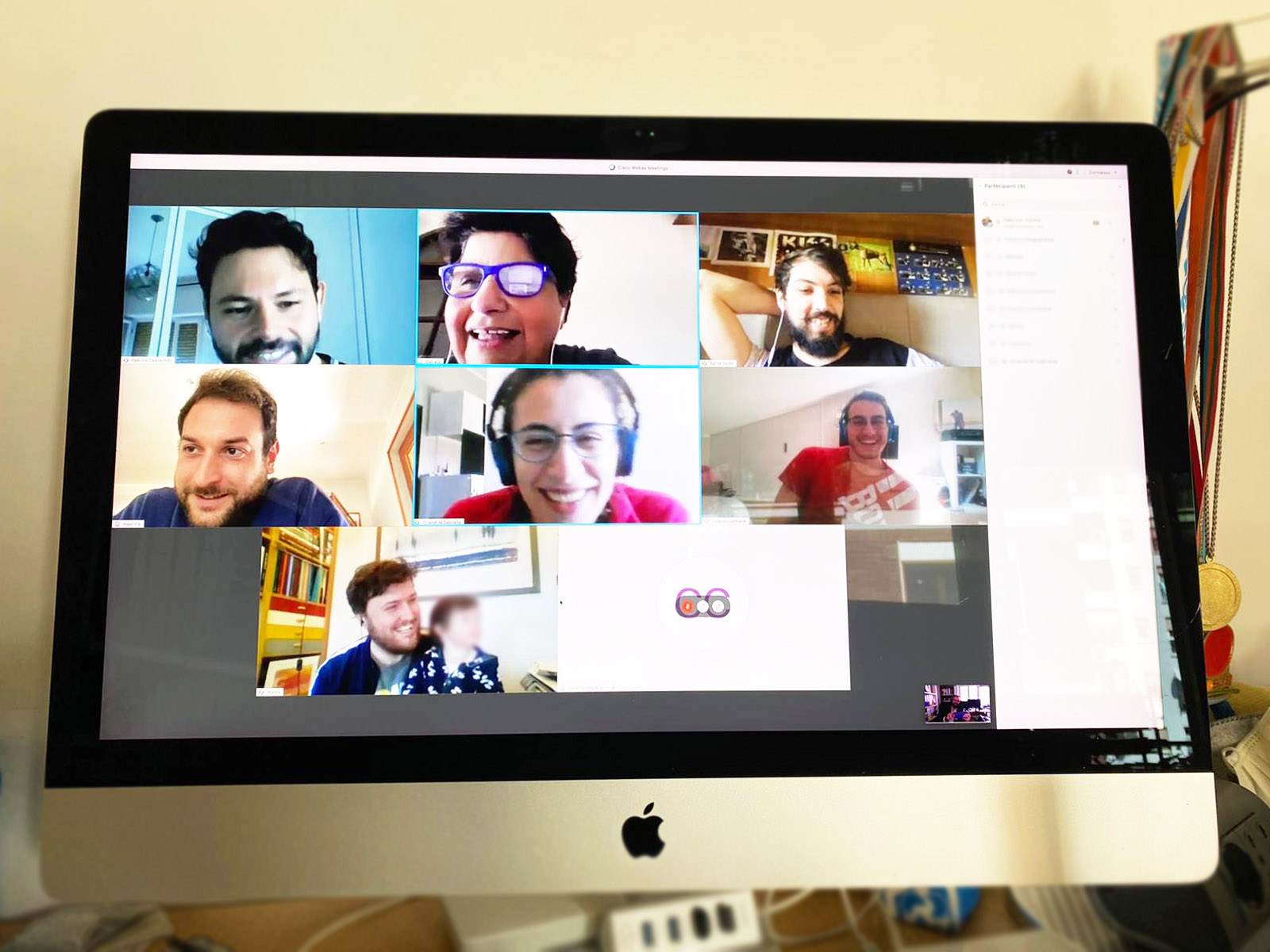
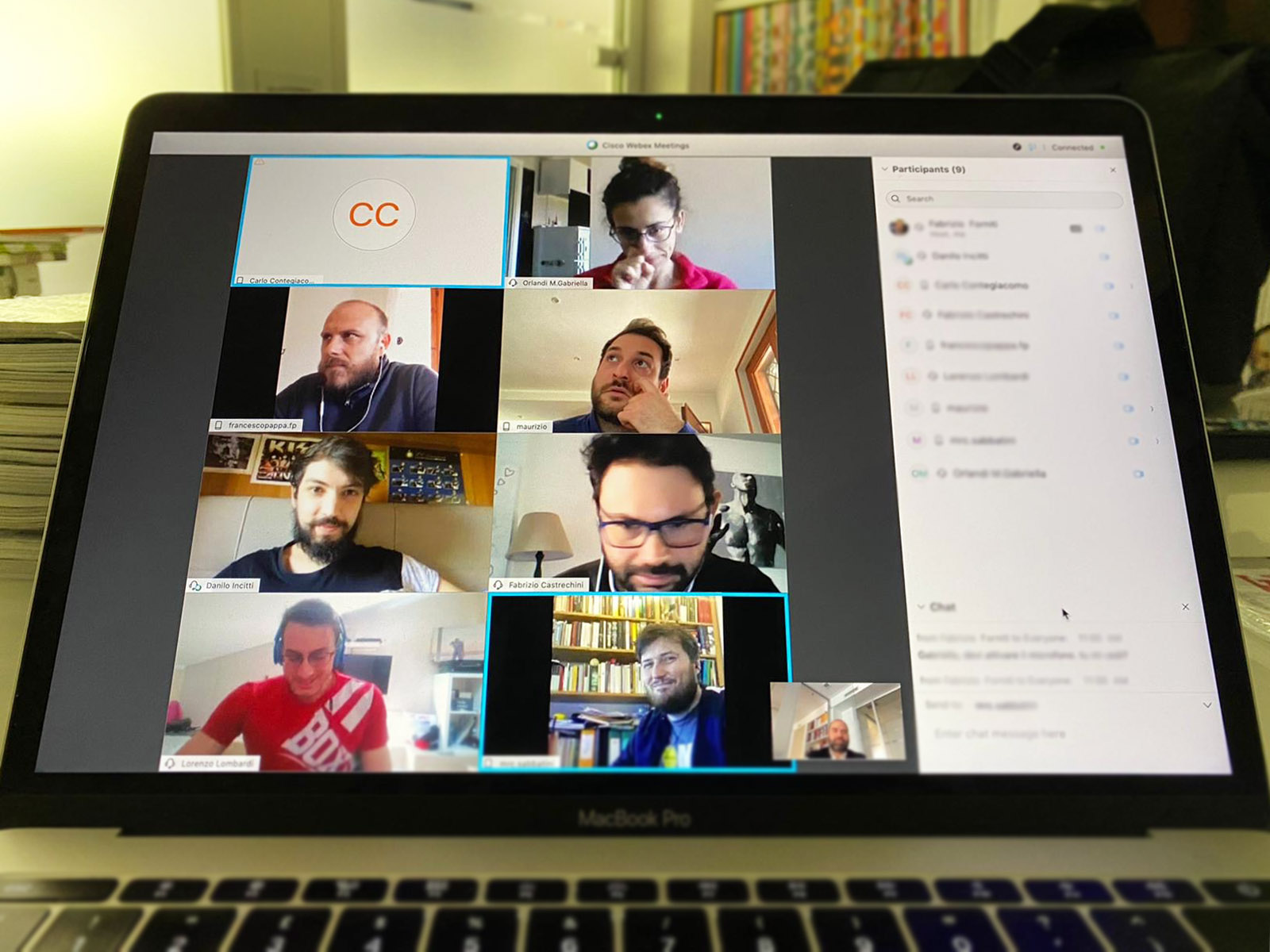
Hypothetical return to normality: aspects to be improved, maintained, or changed.
None of us can know when and how we will return to our "normality". No one is able to know how the recovery will be like and if we will do things as we did in the past, or otherwise.
From a human point of view, the hope is that this emergency situation has developed an awareness on the beauty and preciousness of things that we took for granted before, thus resulting in a desire of living in a less negative a more joyful way our own lives, as well as our work activity.
Lastly, the hope is that everybody tries to maintain and develop the technologies and working methods used in this emergency period, without abandoning the good things we have done so far.
None of us can know when and how we will return to our "normality". No one is able to know how the recovery will be like and if we will do things as we did in the past, or otherwise.
From a human point of view, the hope is that this emergency situation has developed an awareness on the beauty and preciousness of things that we took for granted before, thus resulting in a desire of living in a less negative a more joyful way our own lives, as well as our work activity.
Lastly, the hope is that everybody tries to maintain and develop the technologies and working methods used in this emergency period, without abandoning the good things we have done so far.
